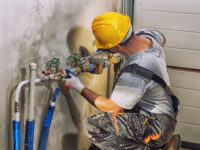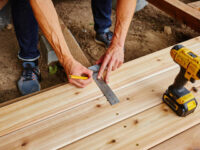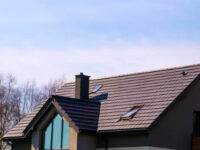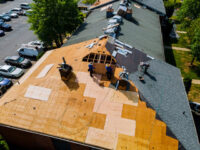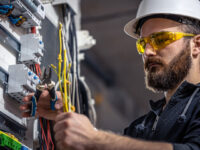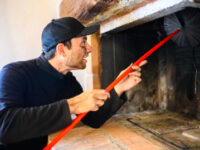Commercial Roofing Installation
Whether constructing a new commercial building or replacing your existing roof, the type of roofing material you choose will impact your facility for years. Many options are available, from low-slope roofs to single-ply membranes.
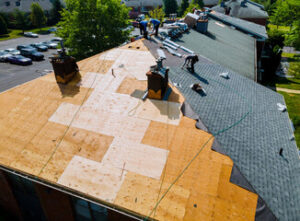 A good contractor will have a track record of using high-quality materials and following industry best practices. In addition, Roofing Columbus GA will understand the local climate and weather conditions and know which products are best suited to them. This will ensure durability and long-term performance.
A good contractor will have a track record of using high-quality materials and following industry best practices. In addition, Roofing Columbus GA will understand the local climate and weather conditions and know which products are best suited to them. This will ensure durability and long-term performance.
Built-up roofs are asphalt-based systems with layers or piles that enhance durability. Metal is another popular option for steep sloped roofs. It’s available in materials like tile sheets, stainless steel, aluminum, copper, zinc, and tin.
Commercial roofs protect businesses, stores, apartment buildings, and many other types of commercial structures. They are designed to protect the contents and occupants of these building from rain, hail, and melting snow. They also help control the temperature inside of the building. If the roof is damaged, it can lead to expensive repairs and disruptions in business operations. The cost of commercial roofing can vary significantly depending on the type of material used, the size of the building, and the location.
There are two main types of commercial roofs: flat and sloped. A flat commercial roof is typically covered with single-ply membranes like TPO, PVC, and EPDM. These materials provide excellent water resistance, durability, and energy efficiency. They are also relatively inexpensive and easy to install. A sloped commercial roof, on the other hand, can be covered with a variety of materials including asphalt shingles and metal. A metal roof is typically more expensive than a shingle roof but it provides superior weather resistance and long-lasting performance.
The cost of a commercial roof can also be affected by the size and complexity of the building. Larger buildings require more materials and labor to construct than smaller buildings. This is because the structure of a commercial roof is much more complicated than that of a residential roof. Furthermore, larger buildings have more openings for pipes and vents. Additionally, the number and size of windows on a commercial roof can affect the cost.
Another factor that can influence the cost of a commercial roof is the condition of existing materials. For instance, if the existing underlayment and shingles need to be replaced, this can add up to the total cost of the project.
Commercial roofs must be inspected regularly to ensure that they are in good condition. These inspections can identify problems of all sizes and address them before they become bigger issues. The inspections can also look for potential problem areas such as clogged gutters and downspouts, mechanical equipment that may be located on the roof, and possible entry points for pests. The inspections can be conducted by a professional roofer or the building owner.
Material
The type of roofing material you choose for your commercial building will impact the longevity, durability and cost of your roof. You should consult a qualified roofing expert to ensure the right roof for your building and business needs. For example, a restaurant will need a different type of roof than a jeweler or retail store. You will also want to consider the slope of your roof as this can affect the types of materials that can be used.
Membrane roofing systems are the most popular choice for commercial buildings because of their durability and long life expectancy. They are also economical and flexible enough to adapt to unique roof designs. The most common membranes are TPO, EPDM, and PVC. TPO (thermoplastic polyolefin) is an increasingly popular choice because it provides many of the benefits of EPDM with a lower up-front cost.
EPDM (ethylene propylene diene monomer) is an extremely durable rubber membrane that is highly energy efficient and is available in a variety of colors. It is highly reflective, helping to keep the inside of your building cooler and more comfortable. EPDM is also waterproof and highly wind resistant.
PVC (polyvinyl chloride) is a very durable and fire-resistant roof membrane that is also energy efficient. It is also extremely lightweight, reducing the stress on your building structure. PVC is highly resistant to UV radiation and can be welded together.
Metal roof and wall panels are a great option for commercial projects. These are made of overlapping panels that are fastened directly to the roof deck or wall framing. They are often a more affordable choice than a standing seam metal roof system.
Built-up roofing systems are another roofing option that has been in use for decades. They consist of felt or fabric layers, called plies, alternated with asphalt bonding materials and then topped with a layer of surfacing material to protect against moisture and other damage. The main disadvantage of a BUR is that it is not as durable or waterproof as other roofing materials.
Installation Method
Commercial roofing is a complex process that involves installing and repairing large roofs on commercial buildings. This includes restaurants, retail centers, office buildings, warehouses and more. The roof of a commercial building protects everything that is inside it from the elements. Therefore, it is important to choose a professional contractor with experience in installing and replacing commercial roofs.
There are a number of factors that can influence the timeline for a commercial roofing project. These include the type of roof, the size of the building, and its pitch. In general, larger and more complex roofs require longer installation times than smaller roofs. In addition, the weather can affect installation, as it may cause rain or other conditions that can interfere with work.
Another factor that can influence the timeline is the quality of the roofing material. There are a wide range of roofing materials available on the market, and not all of them are created equal. High-quality roofing materials are designed and manufactured to meet stringent industry standards and undergo rigorous testing to ensure that they perform well in a variety of environments. They are also more durable and offer greater resistance to damage.
Additionally, a quality commercial roofing contractor will stay abreast of new innovations in the field. This can include new technologies that provide better resistance to heat or cold and optimize energy efficiency. They will be able to recommend the right roofing solution based on the unique needs of their customers.
It is important to consider the total cost of a commercial roofing project, including labor and materials. A reputable roofing company will be transparent about their pricing and provide detailed quotes for the proposed scope of work. This will allow you to compare the prices and quality of services offered by different contractors. However, be wary of significantly low bids, as they may indicate subpar materials or workmanship.
Warranty
When you invest in a new roof for your commercial property, you want to make sure that the investment is protected. One way to do this is by getting a warranty from the roofing contractor. There are several types of warranties available, and it is important to understand what they cover before signing a contract with a roofing contractor.
The most basic type of warranty is the manufacturer’s material warranty. This covers the cost of the materials and may also include the labor to install them. This type of warranty typically lasts from 10-30 years, depending on the system installed. It is important to note that this type of warranty does not cover workmanship errors or weather-related damage.
Roofing manufacturers typically provide a labor or workmanship warranty on top of the material warranty. This type of warranty covers problems resulting from the installation of the roof. The length of this warranty varies from company to company, and some may offer 1 year while others provide up to 5 years. This type of warranty is generally more for peace of mind than for coverage in the case of a major problem.
It is important to note that these types of warranties do not cover consequential damages, such as water leaking into an office and damaging computers. Additionally, if you modify the roof in any way, the warranty may be voided. For example, adding a solar panel may void the warranty as it is considered an alteration to the roof.
Another type of warranty that you should consider is a rider that covers the roof in the event of a catastrophic failure. This upgrade typically costs a little more and adds an extra layer of protection to the roof. For instance, if your building is in an area where storms often reach 72 MPH or higher, you can get a rider that will cover the roof in this event.
Regardless of what type of warranty you have on your roof, it is always best to file a claim right away when something goes wrong. The best thing to do is document the issue and call the warranty claims department listed on the warranty. Typically, they will dispatch the roofing contractor who originally installed the roof to come take a look and handle the repair.

